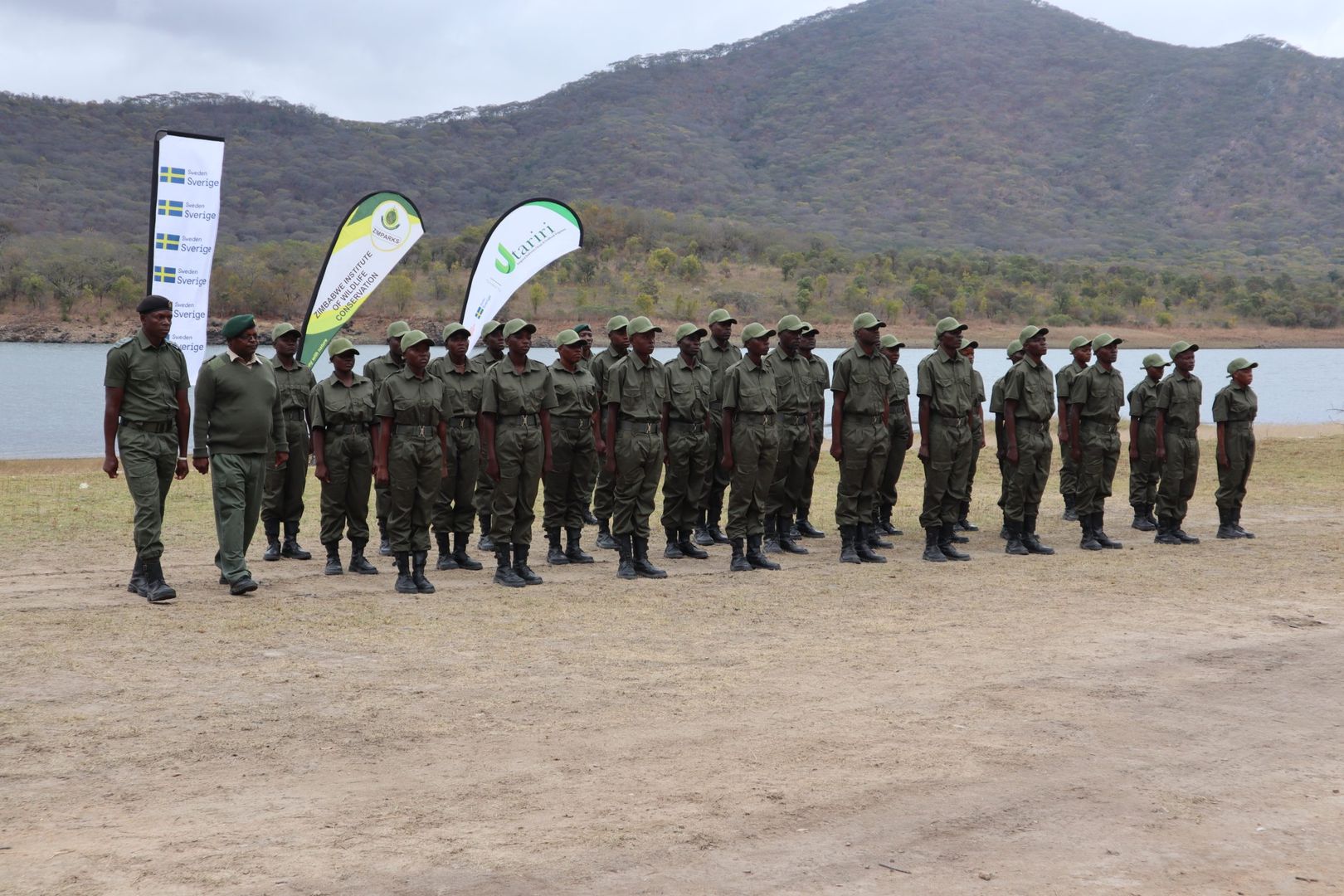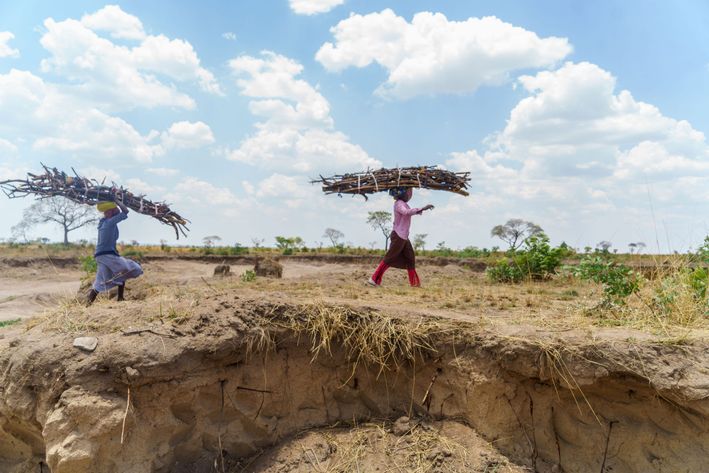The story of Brightness Siyahundu is still a nightmare for the community in Siyamavhu village. It was on the morning of 19 November 2022 around 7 o’clock, the heat was just settling in.
As usual Brightness, a 26-year-old mother of a playful five-year-old boy, was going about her daily chores. Brightness took her 20-litre plastic bucket to fetch water from Nyaodza river, as she did every day.
Little did she know that what was about to happen on that day would change her life for ever.
Upon reaching the river Brightness put her bucket into the river and immediately a crocodile rushed at her and bore into her right leg. Instinctively she screamed. Then just as suddenly her bucket was gone, and she was being dragged into the water. At the same time, both the shock and horror of her reality began to sink in.
Fortunately for Brightness, there were two men just up ahead in a small boat in the river. They saw the commotion and heard her piercing screams. Promptly they arrived on the scene and managed to scare away the crocodile and save the young mothers life. She was rushed to a hospital in Kariba almost an hour away by speedboat, for treatment. Two days and two hospital transfers later, Brightness was informed that her leg had to be amputated and nothing more could be done.
Losing more than a leg
Before the amputation Brightness’s future looked bright. She was the village hairdresser and supplemented her income by fishing and farming. Being crippled has since affected her once flourishing business and limited her livelihood options. Her husband, Twoboy Saineti (29) is a fisherman. On a good day Twoboy sells fish worth $5 USD. He found it very difficult to accept their new circumstances and his a now crippled wife.
The couple’s young son is now no longer going to school after his mother’s accident. Brightness now dreams of starting a business where she can sell clothes and groceries to secure the family’s income.

Human Wildlife Conflict
Increased incidences of human wildlife-conflict plague more than 68% of local households in districts across the lower Zambezi Valley, who indicated that they have encountered some form of human-wildlife conflict in their community involving elephants, lions, and crocodiles.
Supporting ascertains by Zimbabwe Parks and Wildlife Management Authority that the two main animals to attack humans are elephants and crocodiles followed by buffalo and lions. This is due to reduced geographic landscape carrying capacity on account of (human) population growth, settlement encroachment into protected areas, shared sources of water between people and animals, climate change, and habitat loss. Ironically, 80% of citizens are aware of wildlife preservation in these protected areas despite venturing into them, and 92% are aware of their obligation to protect the natural resources.
While a lack of development, poverty and survival are weighty factors, these are the challenges that the Swedish government in Zimbabwe has tasked Utariri to address over the next three years. The results of the programme will feed into reporting on the Swedish Development Cooperation Strategy for Zimbabwe over the 2022–2026 period.
Already positive results are beginning to show. In the fourth quarter of 2022 the Embassy of Sweden in Zimbabwe awarded the DCA led Utariri biodiversity, climate change and livelihoods programme a $5.5 million USD grant.
The programme which seeks to contribute to the Zimbabwe government’s National Development Strategy by delivering on aspects of protection, conservation, and restoration of biodiversity, aligning local activities to global priorities on climate and biodiversity, has among other interventions started installing solar powered boreholes to separate water sources for community and wildlife.

Through the programme 28 community scouts, including 15 females, graduated from the Zimbabwe Institute of Wildlife Conservation in July 2023 having acquired the skills and qualifications to support the work of Nation Park Rangers as the first line of defence between the community and wildlife.
The community scouts are an added resource that will go a long way towards combatting poaching, which wiped out the entire population of rhinoceros in the area in the past 10 years. The scouts are all unemployed youth from villages in the lower Zambezi Valley who are now not only gainfully employed but active citizens better able to contribute to the development of their local communities.
Consortium of international and national actors
The Utariri Integrated Biodiversity, Climate Change and Livelihoods Programme is being implemented by consortium partners: DanChurchAid (DCA), African Wildlife Foundation, Bushlife Africa Trust, Future of Hope Foundation, and the Farmers Association of Community Self Help Investment Group (FACHIG) in the Zambezi Valley. In this way the Embassy of Sweden is complementing the development and humanitarian sectors’ global localisation agenda, to drive social and economic inclusion of local communities.
The Programme has adopted a one-health intervention model to the wildlife economy, where the health of the environment, wildlife, and communities equates to the health of all. This is geared at transforming rural livelihoods, promoting climate action and biodiversity protection in the landscape. Specific livelihood interventions include non-timber forest products, biodiversity protection, and natural resources management which will reach 12,000 households, across 85 Wards in Mashonaland Central and Mashonaland West.
Mushrooms are a way out of the ‘tobacco trap’
Agriculture is the mainstay of most small-scale farmers with crop farming more dominant in areas such as Upper Muzarabani where a barren landscape gives glaring evidence of the ‘tobacco trap’. The ‘tobacco trap’ is characterised by negative social, economic, and ecological activities whose benefit to the tobacco economy supersede environmental and conservation concerns. Ironically, the rapid rate of deforestation has now left farmers without precious wood fuel need to cure the tobacco.
Working with these farmers and communities, Utariri is promoting a transition away from the ‘tobacco trap’ and high-value crops, apiculture, mushroom farming and other climate smart alternatives with shorter cycles and low socio-ecological footprints.
Among the tasks is creating sustainable market linages and value chains, to ensure the long-term benefits to the farmer for making the transition.
Astonishingly some farmers have already converted their tobacco barns into mushroom hubs with many more expressing their intentions to do the same, demonstrating their firm commitment to move away from the green leaf.
“Tobacco is destroying nature.” Says Paul Chagura, a former small-scale tobacco farmer in Hurungwe. In an interview in September 2023 with the Utariri team outside a tobacco barn he has converted into a mushroom hub, Chagura said: “This is why I would rather grow mushrooms.

Chagura says the he would cut down as much as 15 trees to cure tobacco. “Not small trees. I am talking about big trees. And I realised that if I keep cutting down trees like this, my grandchildren will never see a single tree,” he explains.
Gender participation in the local economy
Paulina Jali is a single mother living in Hurungwe. Paulina had all but given up on her future, as she found herself competing for her crops with elephants and other animals from the conservancy where she lives on the boundary.
Every year, elephants would destroy her crops before she could harvest them and feed her family. Not to mention the nuisance created by baboons and the consistent livestock deaths due to attacks by lions, leopards, and hyena in the area, which saw her livestock as a buffet.
When Utariri introduced mushroom training, she jumped at the chance and soon after converted her rondavel kitchen into a thriving household mushroom hub.
Now she has orders of over 40 punnets a week, amounting to $40 per week, from the International Anti-Poaching Foundation based in the area.

She buys mushrooms from the community to make up the difference whenever she has a shortfall, and even supplies people in the nearby town of Karoi. To meet demand Paulina has even converted another room, temporarily kicking-out her now adult boys to make way for her business, until she can build them a new room.
Utariri: Rights based, equitable benefication for economic development
Being strategic pillars of the Embassy of Sweden’s strategy, mushrooms are not the only youth and gender focused Utariri interventions: Districts across the Zambezi Valley exhibit well-developed non-timber forest product (NTFP) value chains incorporating wild fruit (masawu), baobab and more.
However, most of the NTFP harvesting is unlicensed creating an opportunity for unequitable beneficiation, where communities still have very strong loyalty to traditional governance of common property resources, conflict resolution and protection of resources. In this instance, the Utariri programme is collaborating with other programmes funded by the Embassy of Sweden to strengthen a rights-based approach, equitable beneficiation, economic development, all the while promoting community stewardship of natural resources.
One of the interventions that Utariri has introduced, by partnering with Kanakisa a local, 100% women organisation, is a business venture that partners with communities, harvesting NTFPs, processing them locally to produce natural products such as oils and other cosmetics such as soaps, teas and more.
The ambition is not only to create jobs but to secure domestic and international markets for these products thus, improving the lives of ordinary women and youth with otherwise limited livelihood options in the Zambezi Valley.


